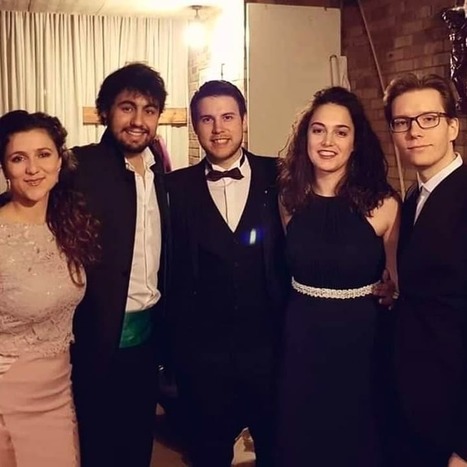Soaring artists
For « Balade Musicale à Rixensart », whose pledge is to give support to young budding artists, Music is an art that builds all the others. Its 6th season was closing last night with a magnificent Mozart concert given in the Sainte-Sixte Church in Genval. It gathered 31 outstanding young musicians, most of them coming from the IMEP (Institut supérieur de musique et pédagogie) the renowned school in Namur. Aces high!

The pleasing programme first featured a few excerpts of Mozart’s operas – Die Zauberflöte, Don Giovanni and Cosi fan tutte –, highlighting the crisp vocal talents of the four young soloists: Gianna Canete Gallo, Doris Brasseur, Pierre Derhet and Kamil Ben Hsaîn Lachiri. The Belgian baritone Kamil Ben Hsaïn Lachiri baritone, 25, who sang Papageno in Die Zauberflöte in 2017 in the Liège House, gave the audience a generous and light-hearted German and French sample of his “Zauber” talent followed by beautiful rendition of « Deh vieni alla finestra » from Don Giovanni set in a basket of graceful pizzicati. The smooth baritone would then, perfectly support the sopranos in “Soave sia el vento”. One also remembers his highly spirited Wagner in “Faust” produced at L’Opéra de Liège earlier on in 2019. His amazing warm voice is impressive, velvety, most mellifluous and profoundly glowing, encompassing a large scope of vivid colours.

Then came the magnificent interpretation of Mozart’s opulent Mass in C minor, K427. This baroque sounding mass dates from the last decade of his life, his years in Vienna. Though incomplete, it is perhaps considered as the epitome of sacred music as it flourishes with presence.
Conducting L’Ensemble Pizzicato, we find young rising star Ayrton Desimpelaere. Among his many commitments in 2018-2019, there was the brilliant Matrimonio segreto (Cimarosa) , Massenet’s Don Quichotte turned into a participative opera for youngsters at theOpéra Royal de Wallonie, and recently, in the same house, he has even taken over conducting Verdi’s Aïda to substitute for Speranza Spaducci, who was taken ill. Both times, standing ovation was the response of the thankful audience. Over a week he had delivered no less than l2 concerts! Stars are with him!
Accomplishment. After the exquisite entry of violins Ayrton Desimpelaere immediately built up cumulative dramatic power that soon turned the “Kyrie” into a monumental ensemble, with a chorus only made up of 8 chorists. The quatuor of unaffected soloists conveyed tranquil splendor and humanity. The first soprano Gianna Canete Gallo conveyed inner truth to her “Christe Eleison” not dreading the dangerous leaps of vocal acrobatics. “Laudamus te” sung by Doris Brasseur was teeming with warm light shades. Both sopranos gave an energetic rendition of “Dominus deus”, triumphantly emerging within the eight verses of the Gloria. The smooth and aerial approach of conductor never indulged in ecclesiastical solemnity apart from the heavy paced and sombre “Qui tollis” that carries all our inequities. He fluidly delivered the whole with dedication and with bouncing exultation. The fusing various “Miserere”seeming to come from nowhere and everywhere at the same time, appeared like a bunch of humble supplications, fully developed, ending with noble elevation. Amazing balance characterized the trio singing “Quoniam Tu solus sanctus” which sounded like flushing happiness within a tempest of emotions. Uplifting clear and passionate tenor Pierre Derhet shaped the words with inspiration and texture. He owns a full and robust tone. Make a mental note: he will soon be singing in Meyerbeer’s « Robert le diable » with la Monnaie ochestra at Bozar. The final fugue was opulent, sustained by a beautifully resounding hornist. Every musician seemed to enjoy sipping the young conductor’s accurate gestures, and meaningful glances, a gaze sending off each of them in turn to the shores of infinity.
But of course, the secret heart of the work is in the Credo’s stupefying “Et Incarnatus est” with its refined solo line richly sung by Gianna Canete Gallo surrounded by speaking winds passionately respectful of the mystery in being, aware of the divine grace. Reflecting the tender love of a mother. This is how Mozart’s masterwork operates: provoking a rustling taste for eternity mixed with perfection made visible in the last piece: “Benedictus”. The soaring quatuor and the orchestra celebrate life. A profound joy that saves the world “In nomine domini”. Encore!
ACCUEIL
La version française, directement sur Arts et Lettres